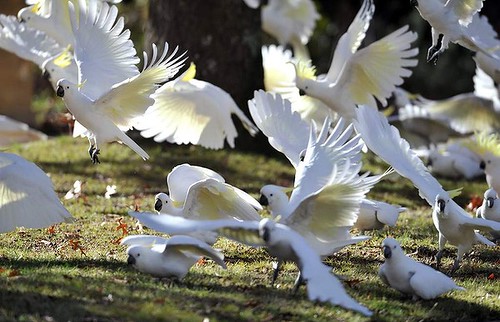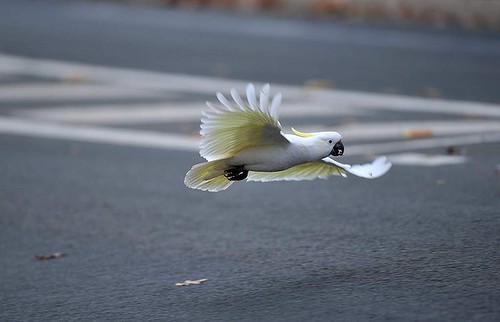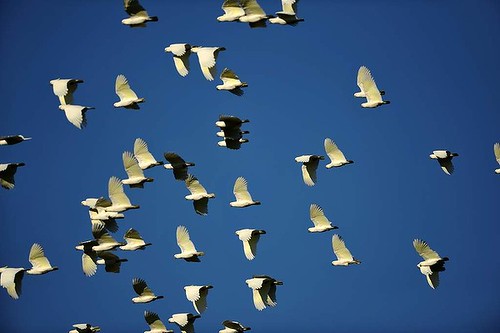Pests no longer: Sulphur-crested Cockatoos part of the fabric of Canberra
 Tuesday, December 24, 2013 at 7:46
Tuesday, December 24, 2013 at 7:46  These individuals compete for ground. Photo: Graham TidyThe Canberra region’s Sulphur-crested Cockatoos have long since forgiven the locals who used to shoot them as pests.
These individuals compete for ground. Photo: Graham TidyThe Canberra region’s Sulphur-crested Cockatoos have long since forgiven the locals who used to shoot them as pests.
In his memoirs pioneer Samuel Shumack (1850-1940) recalled one single day in the 1880s when with his busy blunderbuss he shot more than 500 of them and other members of ‘‘the parrot family’’.
 Sulphur Crested Cockatoos in the inner south suburban streets. Photo: Graham TidyToday, having put all those persecutions behind them and bearing no grudges these big white cockatoos (Cacatua galerita) live in and around Canberra in comfortable abundance. The Canberra Ornithologists Group says they are ‘‘common breeding residents’’.
Sulphur Crested Cockatoos in the inner south suburban streets. Photo: Graham TidyToday, having put all those persecutions behind them and bearing no grudges these big white cockatoos (Cacatua galerita) live in and around Canberra in comfortable abundance. The Canberra Ornithologists Group says they are ‘‘common breeding residents’’.
Though common in numbers there is nothing common about their appearance and sheer, characterful presence.
 Sulphur Crested Cockatoos. Photo: Graham TidyAs well as being so large and bulky, weighing up to 975 g and having wingspans of up to 103 cms (compare with the biggest magpies weighing up to 350g and with wingspans of up to 85cms) they have a voice that the biblical Handbook Of Australian, New Zealand and Antarctic Birds first describes with one word: ‘‘Unmistakable.’’
Sulphur Crested Cockatoos. Photo: Graham TidyAs well as being so large and bulky, weighing up to 975 g and having wingspans of up to 103 cms (compare with the biggest magpies weighing up to 350g and with wingspans of up to 85cms) they have a voice that the biblical Handbook Of Australian, New Zealand and Antarctic Birds first describes with one word: ‘‘Unmistakable.’’
Then, getting more explicit, the handbook credits the species with a voice that is ‘‘a harsh, raucous screech terminating with a slight upward infection, or raucous, shattering, ear-splitting screech’’.
 This individual tempts fate as it flies low across the road. Photo: Graham TidyWe would notice just one Sulphur-crested Cockatoo (so big, so ghostly white) but of course it is the way they get about in such vast congregations (‘‘parties and flocks of hundreds’’ the handbook marvels) that turns our heads.
This individual tempts fate as it flies low across the road. Photo: Graham TidyWe would notice just one Sulphur-crested Cockatoo (so big, so ghostly white) but of course it is the way they get about in such vast congregations (‘‘parties and flocks of hundreds’’ the handbook marvels) that turns our heads.
The poet ‘‘Banjo’’ Paterson himself marvelled at this gregariousness it and made it a feature of his reverent poem White Cockatoos.
In the poem one ‘‘scout’’ cockatoo finds a field of plump corn-cobs, and then:
Back he goes to where the meeting Waits among the trees.
Says, ‘‘The corn is fit for eating;
Hurry, if you please.’’
Skirmishers, their line extending,
Shout the joyful news;
Down they drop like snow descending,
Clouds of cockatoos.
 A group take to the air. Photo: Graham TidyLucky Canberra where it is an everyday experience for us to see clouds of Sulphur-crested Cockatoos dropping, like snow descending, into the city’s parks and gardens.
A group take to the air. Photo: Graham TidyLucky Canberra where it is an everyday experience for us to see clouds of Sulphur-crested Cockatoos dropping, like snow descending, into the city’s parks and gardens.

